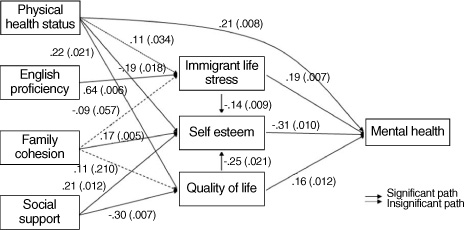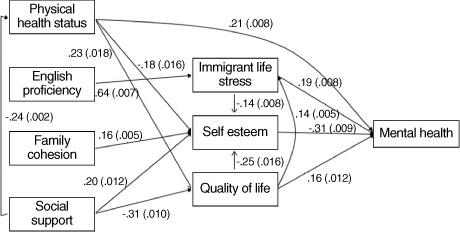J Korean Acad Nurs.
2010 Jun;40(3):389-399. 10.4040/jkan.2010.40.3.389.
A Structural Equation Model on Mental Health of Korean Immigrants in Canada
- Affiliations
-
- 1Department of Nursing, Inje University, Busan, Korea.
- 2Department of Nursing, Korea National Open University, Seoul, Korea. anywayyoung@knou.ac.kr
- KMID: 987586
- DOI: http://doi.org/10.4040/jkan.2010.40.3.389
Abstract
- PURPOSE
The aim of this study was to construct a structural equation model that would further explain the mental health status of Korean immigrants living in Canada.
METHODS
Survey using a structured questionnaire was conducted with 386 people in Canada (Vancouver and Toronto). Six instruments were used in this model. The analysis of data was done with both SPSS 14.0 for descriptive statistics and AMOS 5.0 for covariance structure analysis.
RESULTS
Based on the constructed model, physical health status, immigrant life stress, self esteem, and quality of life were found to have significant direct effect on mental health. In addition, factors such as physical health status, immigrant life stress, quality of life, English proficiency, family cohesion and social support were found to indirectly affect mental health. The final modified model yielded Chi-square=34.79 (p<.001), df=13, Chi-square/df=2.68, GFI=0.98, AGFI=0.94, NFI=0.95, PNFI=0.44, PGFI=0.35, RMSE=0.07 and exhibited good fit indices.
CONCLUSION
This structural equation model is a comprehensive theoretical model that explains the related factors and their relationship with mental health in Korean immigrants. Findings of this study can contribute to the designing of an appropriate prevention strategy to further improve the mental health of immigrants in Canada.
Keyword
MeSH Terms
Figure
Reference
-
1. Bae JY. Causal relationships between school adjustment of middle school students and related variables. Journal of Korean Academy of Nursing. 2008. 38:454–464.2. Bernstein KS. Mental health issues among urban Korean American immigrants. Journal of Transcultural Nursing. 2007. 175–180.3. Bhugra D, Minas IH. Mental health and global movement of people. 2007. 370:1109–1111. Published Online www.thelancet.com.4. Campbell A. The sense of well-being. American Psychologist. 1981. 31:117–124.5. Carmines E, Mclver J. Analyzing models with unobserved models: Analysis of covariance structures. 1981. Beverly Hills, CA: Sage.6. Choi YH. The comparative study on health-promoting behavior, life satisfaction and self-esteem between Korean elderly and American-Korean elderly. Journal of Korean Academy of Nursing. 2003. 14:31–39.7. Christopher KA, Kulig JC. Determinants of psychological well-being in Irish immigrants. Western Journal of Nursing Research. 2000. 22:123–143.8. Derogatis LR, Govi L. An out patient psychiatric ratingscale preliminary report. Psychopharmacology Bulletin. 1973. 9:13–27.9. Furnham A, Shiekh S. Correlates of mental health in Asian immigrants. International Journal of Social Psychiatry. 1993. 39:22–33.10. Hoschl C, Ruiz P, Casas M, Musalek M, Gaebel W, Vavrusova L. The impact of migration on mental health and mental illness. European Psychiatry. 2008. 23:S42.11. Hovey JD, Magana C. Acculturative stress, anxiety, and depression among Mexican immigrant farmworkers in the Midwest United States. Journal of Immigrant Health. 2000. 2:119–131.12. Jeon BJ. Self-esteem: A test of its measurability. Yonsei Nonchong. 1974. 11:109–129.13. Jeong WS. Family environment diagnosis test. 1989. Seoul: Korean Testing Center.14. Kim HS. Cultural identity, acculturation, and mental health of immigrant youths: Review study for Canada's immigrant youth population. Journal of Korean Academy of Psychiatric and Mental Health Nursing. 2006. 15:384–391.15. Kim KL, Kim JH, Won HT. Korean manual of symptom checklist-90-revision. 1984. Seoul: Chungang Aptitude Publishing Company.16. Kim MT, Han HR, Shin HS, Kim KB, Lee HB. Factors associated with depression experience of immigrant populations: A study of Korean immigrants. Achives of Psychiatric Nursing. 2005. 19:217–225.17. Kim YS. The socio-cultural adaptation and residential mobility of the Koreans in Australia. The Korean Association of Professional Geographers. 2006. 40:497–512.18. Lahti IJ, Liebkind K, Jaakkola M, Reuter A. Perceived discrimination, social support networks, and psychological well-being among three immigrant groups. Journal of Cross-Cultural Psychology. 2006. 37:293–311.19. Lee JB. Asian immigrants in Canadian schooling. Korean Comparative Education Society. 1999. 9:155–178.20. Lee MS. The subjective quality of life of Korean workers and associated variables. 1998. Seoul: Yonsei University;Unpublished doctoral dissertation.21. Lee SM. Covariance structure analysis. 1990. Seoul: Seongwonsa.22. Lee SW. Correlation study between stress response and life events as a stressor. The Journal of Nurses Academic Society. 1993. 23:299–315.23. Migration statistics. Ministry of Foreign Affairs and Trade. 2010. 02. 23. Retrieved April 6, 2010. from http://www.mofat.go.kr/help/search/index.jsp.24. Noels KA, Pon G, Clement R. Language, identity, and adjustment: The role of linguistic self-confidence in the acculturation process. Journal of Language and Social Psychology. 1996. 15:246–264.25. Oppedal B, Røysamb E, Sam DL. The effect of acculturation and social support on change in mental health among young immigrants. International Journal of Behavioral Development. 2004. 28:481–494.26. Sam DL. Psychological adaptation of adolescents with immigrant background. The Journal of Social Psychology. 2000. 140:5–26.27. Shen BJ, Takeuchi DT. A structural model of acculturation and mental health status among Chinese Americans. American Journal of Community Psychology. 2001. 29:387–418.28. Son S, Lee JM, Ryu CW. A study on the effect of acculturative factors on the psychological well-being of Korean American older immigrants in New York city. Journal of Welfare for the Aged. 2007. 38:79–107.29. Suh YO. Predictors of quality of life in women with breast cancer. Journal of Korean Academy of Nursing. 2007. 37:459–466.30. You SE. The effects of perfectionism, social support, stress, and coping style on depression in the middle-aged woman. Korean Journal of Clinical Psychology. 1997. 16(2):67–84.
- Full Text Links
- Actions
-
Cited
- CITED
-
- Close
- Share
- Similar articles
-
- Embracing New Lives as Korean Immigrants in Canada: A Grounded Theory
- A Structural Equation Model on Happiness among Adolescents in South Korea
- Model Setting and Interpretation of Results in Research Using Structural Equation Modeling: A Checklist with Guiding Questions for Reporting
- Health Promotion Behavior of Chinese International Students in Korea Including Acculturation Factors: A Structural Equation Model
- Microbusinesses and Occupational Stress: Emotional Demands, Job Resources, and Depression Among Korean Immigrant Microbusiness Owners in Toronto, Canada



